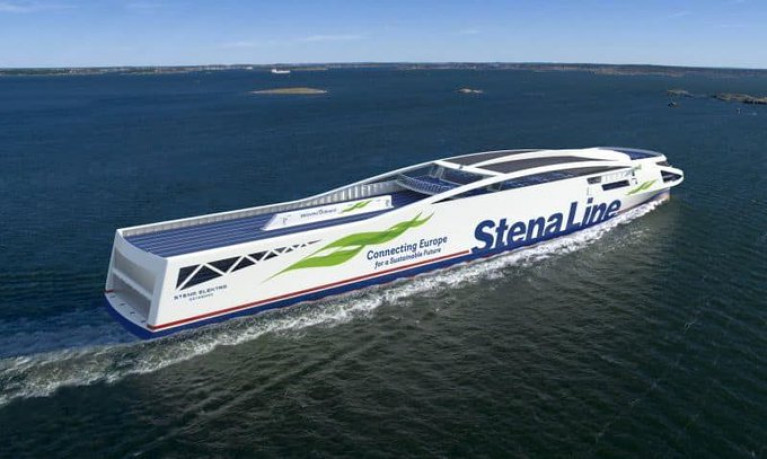Displaying items by tag: Electric ferries 2030
Stena Line and Danish Port Make Historic Agreement on Fossil-Free Ferries Before 2030
Stena Line, the Danish Port of Fredrikshamn and the Fredrikshamn Municipality recently signed an historic agreement, to take their share of responsibility for the Gothenburg-Fredrikshamn route to become the world's first fossil-free ferry line of its kind.
The agreement on the Sweden-Denmark route will involve two battery-powered Stena Elektra vessels launched by 2030 as Afloat previously reported.
Almost 90% of world trade takes place via the oceans, which is why efficient and environmentally friendly passenger and freight transport by sea is crucial for achieving climate goals. The ferry company Stena Line, the municipality of Fredrikshamn and the Port of Fredrikshamn today signed an agreement to increase the pace of the transformation of the transport sector, by deploying two battery-powered Stena Elektra ferries on the Gothenburg-Fredrikshamn line by 2030 and implementing the necessary investments on land.
Stena Line has already previously initiated the Tranzero Initiative collaboration together with the Volvo Group, Scania and the Port of Gothenburg. The aim is to reduce carbon dioxide emissions linked to the port of Gothenburg - the largest port in the Nordic region - by 70% by 2030. With today's agreement with Fredrikshamn municipality and port, the chain will be complete.
“Our ambition is to lead the development towards fossil-free shipping and sustainable transport at sea. That is why we are investing in new technology and various alternative fuels. We are already ten years ahead of the international shipping target for reducing carbon dioxide emissions, but with Stena Elektra we are taking another big step on Stena Line's sustainable journey, on the road to a completely fossil-free business, "says Stena Line's CEO Niclas Mårtensson, who is also member of the Government Electrification Commission.
Stena Line will reduce its total carbon dioxide emissions by 30% by 2030 and the new Stena Elektra ferries are an important part of getting there. However, more than just battery-powered vessels are required. The infrastructure on land, with, for example, sustainable charging possibilities, must be developed in parallel. Therefore, a partnership with all relevant actors is required. In the agreement signed today, the Port of Fredrikshamn undertakes to secure the necessary infrastructure in the port and its surroundings on the Danish side.
“The Port of Fredrikshamn shares the high and green ambitions that make this project possible. The city has also shown that it has a unique ability to change its DNA, which is not least noticeable in its sustainability work. That we are now taking steps towards making the Gothenburg-Fredrikshamn line completely independent of fossil fuels is not only positive for us, but for the entire Kattegat region, ”says Mikkel Seedorff Sørensen, CEO of the Port of Fredrikshamn.
A sustainable connection between two countries
The ferries will be the world's first fossil - free RoPax ship in their size, they will measure approximately 200 meters, have approximately 3,000 cargo meters for cars and trucks, and room for over 1,000 passengers.
The work to reduce the climate impact of the Gothenburg-Fredrikshamn line began as early as 2018, with Stena Line's investment in battery hybrid operation at Stena Jutlandica. So far, this has resulted in a reduction in carbon dioxide emissions by 1,500 tonnes per year, corresponding to the annual emissions from 600 passenger cars.
The municipality of Fredrikshamn also undertakes to participate in the work of creating a sustainable connection between Sweden and Denmark with the two Stena Elektra vessels. ”Stena Elektra is a fantastic project for Fredrikshamn. We know from experience that when the municipality takes the lead, the business community and private individuals follow us in the green footsteps. Our city and Stena Line have long had a close relationship, but this ambitious agreement is not only important to us - it gives ripples on the water throughout Denmark, says Birgit Hansen, chairman of the municipal board (S) in Fredrikshamn municipality.
Facts about Stena Elektra:
- Two fossil-free RoPax ferries (car and passenger ferries)
- Route: Fredrikshamn - Gothenburg
- Will start operating the line by 2030
- Battery-powered with a capacity of approximately 60-70 MWh, charged in port
- Land infrastructure: Need for a high-voltage cable for shore power of around 30-40 MW
- Transit time: 3 hours, with one hour turnaround call / charge time
- Length: About 200 meters
- Freight and car capacity: Approximately 3,000 cargo meters
- Passenger capacity: 1,000-1,500 passengers
























































